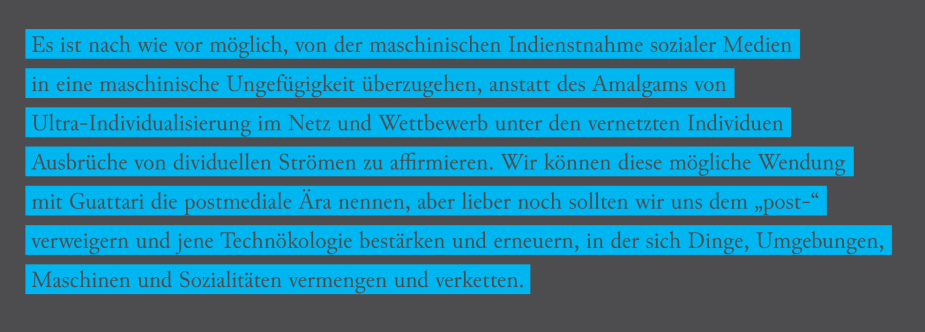Publikation: Christoph Brunner – Activist Sense…
Veröffentlichung von Christoph Brunners Artikel Activist Sense: Affective Media Practices during the G20 Summit in Hamburg

Auszug Technecologies of Sensation
The G20 summit took place in Hamburg from July 6-7, 2017. From July 4-8 Hamburg’s police authority declared a 38.5-square-kilometer area of the city a special security zone. People could be strip-searched without any reason, roads could be blocked for indeterminate periods of time, and any public meeting counting more than two human subjects could be declared an illegal assembly. One might call this a state of exception. However, as I will argue, the term is somewhat misleading. For this ‘state’ is not only prolonged indeterminately; it also becomes a continuous modulation of sensation, of its distribution and suspense. Protest against the G20 summit might be the most visible remnant of the anti‑globalization movement, which took a transnational and media-infused form ever since the 1999 mobilization to Seattle. Its cry “another world is possible” still haunts the discursive sphere of the movements and informs contemporary forms of protest.[1] Yet this cry for alternatives is usually related to social movements and their discursive politics, while the aesthetic and affective aspects of such “alternative ways of living” are overshadowed. My focus here is on the latter. I will consider the international alternative media center FC/FM as it assembled during the G20 protest in Hamburg, in order to shed light on how a technecological experiment develops its own social, sensuous, and affective platform for a politics of activist sense and affective relaying. In the following, I will conceive of the concept of technecology not just in relation to the work of Félix Guattari (2008) but also in resonance with Luciana Parisi’s notion of “technoecologies of sensation.”[2] With this term Parisi focuses on the role of the sensuous as part of a “machining field of code-drifting communication ready to engender surplus values of sensing at all scales of transmission,” which exceeds any pre-given sense of the machine or the human body.[3] In a similar vein Gerald Raunig (in this issue) differentiates technecologies from post-media imaginaries. Technecologies are not only ubiquitous, networked media technologies that bring about new modes of sensing and the production of subjectivity. Rather, they become an integral activating layer, temporalizing, and spatializing, in more-than-human modes of existence. The search for a concept of activist sense revolves around these modes of existence as embodied, felt, and sensuously engaged processes of contemporary media activism.
Hier klicken, um in der englischsprachigen Fassung weiterzulesen.
[1] For a general development of this cry “another world is possible” see also Pignarre, Philippe, Isabelle Stengers, Capitalist Sorcery: Breaking the Spell, Basignstoke: Palgrave Macmillan, 2011 [2] Luciana Parisi, “Technoecologies of Sensation”, ” in: Deleuze/Guattari & Ecology, ed. by Bernd Herzogenrath, Basingstoke: Palgrave Macmillan 2009, p. 182-199
Als Teil des Sammelbandes Technökologien, herausgegeben von Christoph Brunner, Raimund Minichbauer, Kelly Mulvaney und Gerald Raunig erscheint derselbe Text im August 2018 unter dem Titel Activist Sense. Technökologien widerständiger Medienpraktiken ebenfalls bei transversal und ist kostenlos als PDF verfügbar.